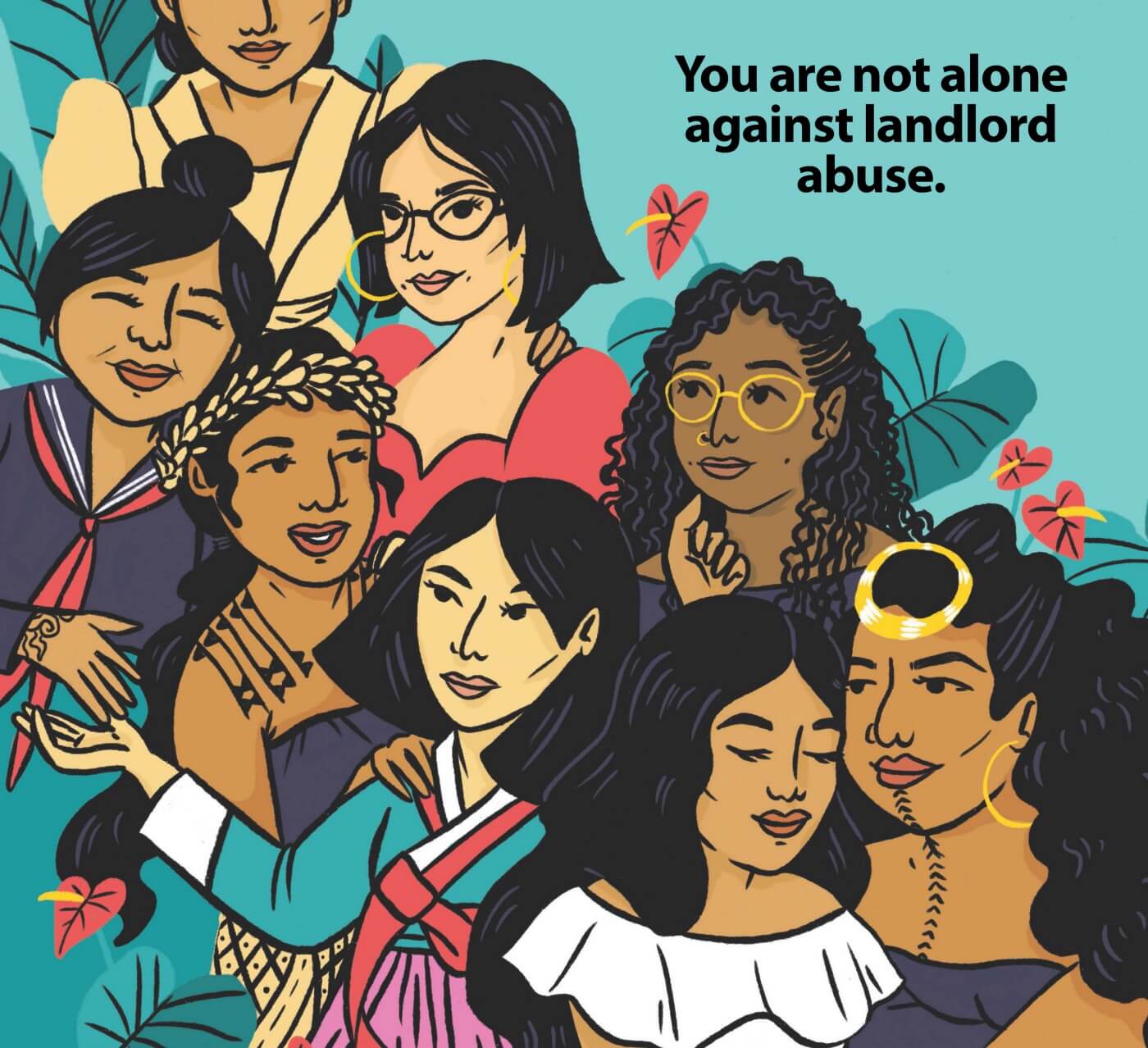
Originally written by Khara Jabola-Carolus, Executive Director of the Hawaii State Commission on the Status of Women and published on Medium.
Landlord sexploitation is the latest byproduct of the pandemic. This is because the responses to COVID-19 — fast and furious in some states, and, in others, molasses slow — all failed to factor in gender and the “non-crisis” reality of male violence waiting around every corner for women, femme identified and non-binary people.
“Safer at Home” campaigns across the country ignore home as a place that jeopardizes women’s lives and liberty. There was no plan upfront to prepare for the physical and sexual violence from the combo of shelter-in-place, lost income and systemic sexism. Sexual predation by landlords, not just domestic violence, makes it hard for women to shelter-in-place.
Many states have paused evictions and the new CARES Act makes it temporarily illegal to evict renters and charge late fees in federally financed properties until July 25. But you still owe rent, and there is no official rent forgiveness policy. About one-third of Americans were unable to pay their rent on April 1. Male landlords are taking advantage of the intensifying financial pressure.
Here’s what you need to know if it happens to you:
It is illegal and discriminatory for a landlord to prey on your economic situation during COVID-19 or any other time to creep on you — whether dick pics, touching, date requests, or “other arrangements.”
It is a violation of the federal Fair Housing Act and state landlord-tenant code. It is also arguable as sex trafficking under the Justice for Victims of Sex Trafficking Act of 2015, which expanded the definition of sex trafficking to include anyone who uses coercion to solicit an exchange of sexual conduct for something of value (rent).
Should you call the cops? Ideally, it is a good idea to report the situation to the police to create a paper trail that protects you in the future. But calling the police is a privilege that women, especially women of color or unsettled immigration status do not always hold. Low-income women of color are the most targeted by rapist-landlords. Calling the police also does not guarantee that they will investigate. If you do call, you should be aware that they will speak to your landlord, who may feel emboldened if not charged. You should be prepared in the event of illegal lockout or retaliation (keep reading). Regardless, make sure you document everything — include a timeline, collect evidence, and tell someone you trust.
How can I hold my landlord formally accountable?
The Hawaiʻi State Commission on the Status of Women is keeping a database of bad landlords and offering guidance on the process, including emergency rent assistance. We can be reached at 808–586–5757.
You should also file a complaint. Normally you would have 180 days to report the incident to the Hawaiʻi Civil Rights Commission (HCRC), which takes jurisdiction unless it’s a federally funded entity. Unfortunately, HCRC is closed during the COVID-19 crisis and it is unclear when they will restore services.
Instead, you can file a complaint directly with the U.S. Department of Housing and Urban Development Office of Fair Housing and Equal Opportunity (HUD FHEO), which continues to conduct fair housing complaint intake through its online portal or by email. You have one year to do so. You can file the complaint online or call. You can find information on how to file a HUD FHEO complaint here. If you need help filing the complaint, you should call the Legal Aid Society of Hawaii. The Legal Aid general intake line is 808–536–4302. It is open Monday to Friday from 9:00 a.m to 11:30 a.m. and then 1:00 p.m. to 3:30 p.m. In recent years, HUD has been hyperactive pursuing sexual harassment claims against landlords.
What about retaliation? Retaliation by your landlord for filing a complaint against him is illegal. If your landlord changes the locks or shuts off your utilities, you can file a landlord-tenant TRO against your landlord and the court will take these cases during the crisis. Courts are still open for TROs. Please contact Legal Aid Society of Hawaiʻi for help with retaliation. There are no income limits for their help when it comes to fair housing matters.
You said this was also sex trafficking. Yes, and you may qualify for services at the state’s main sex trafficking service provider. Please call the national hotline 888–373–7888 to report and they will route you to local help. You can report anonymously and they have translators in every language.
I’m uncertain about my rights as an immigrant, especially in light of the new HUD policies that threaten access to housing. Please contact Maui Immigration Law at 808–244–5858.
To quickly leave this website, click on the orange "exit" button on the top right and you will be redirected to another website. To browse this site safely, remember to regularly clear your browser history.